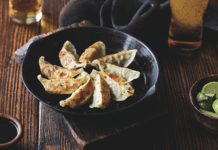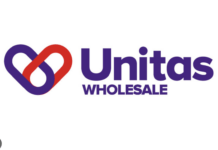Hall’s Drinks, Landmark’s latest member, is expanding into pub food, writes TAN PARSONS
With around 25 pubs closing every week in the UK, the writing may be on the wall for many traditional on-trade venues. And for the wholesalers that keep them supplied with alcohol, this is a worry.
That is why wholesaler Hall’s Drinks is broadening its offer from beers, wines and spirits (plus a few pub snacks and cleaning products) to offer catering essentials, such as peas, pasta and beans.
Put simply, the pubs that are doing well are the ones that serve food.
Hall’s general manager Mike Caulfield says: “It’s a very difficult market. People are going to the pub less. The pubs that are good are selling food. We are delivering to these pubs already, so why wouldn’t they buy these lines from us, too?
“Currently, they are going to cash & carries to buy these things. It’s about broadening our range and giving us more people we can sell to all the time.”
In order to make the group’s transition to food suppliers as quick and strong as possible, Hall’s has teamed up with Landmark Wholesale. They have just put together their first brochure on food and non-food products.
None of the company’s immediate competitors currently offers a food option, and it puts Caulfield in the driving seat to expand the business. While beer and wine might not be high on the shopping list of care homes, for example, food definitely is.
“I was interviewing some sales people recently and one of them told me some of her major accounts were nursing homes and catering homes,” he says.
“We don’t know where this is going to lead us – especially with the service we offer.”
The company’s mission is to have what its customers want when they ask for it and to get it to them in the timeframe in which they need it. It offers a seven-day-a-week service with no delivery charge and no minimum order.
Occasionally, it can be a challenge managing customers’ expectations – especially when they want something delivered immediately. Operating across the rural landscape of Flintshire, Crewe and Cheshire, it classes Rhyl as a ‘local’ delivery, but in reality the town is 20 miles away from the company’s Holywell depot.
A bit like an entrepreneur teaming up with a dragon on the TV show Dragons’ Den, one of the main advantages Caulfield hopes to get from the partnership with Landmark is access to a wide range of contacts.
“We are an independent wholesaler and we thought we would get a lot of knowledge from them,” he says.
“There’s a network of people who are already doing the things we plan to do. We also thought they’d offer us a range of products and contacts that really it would have taken a huge amount of time and resources to do independently.”
The deal has already opened up communications with suppliers the company probably wouldn’t otherwise have found, he adds.
In order to make the most of the alliance, Hall’s has invested heavily in marketing and improving the image of the company.
It has bought new vans and liveried the rest of the fleet in order to create a uniform image and a stronger brand. It has 16 delivery drivers, and a sales team out on the road.
“The drivers are there to present a smart image for the company and make sure the customer is happy,” he says.
Leafleting has increased, too, but it is also about being smart with your marketing strategy. Caulfield’s team have good relationships with suppliers, which talk to customers and market products on their behalf.
[quote_box_right]
Top Tips from Hall’s
- FOOD IS THE FUTURE: The pubs that are ‘good’ are selling food – if you deliver alcohol to pubs already, why not offer them food items, too?
- NO LIMITS MEAN MORE CUSTOMERS: Mike offers a seven-day-a-week service with no delivery charge and no minimum order, which is proving popular with customers.
- UNIFY YOUR IMAGE: Hall’s has bought new vans and updated
- the image of the whole fleet to create a uniform image and a stronger brand.
- HAVE A UNIQUE OFFER: Thanks to a partnership with a brewery, Hall’s offers customers the opportunity to create their own branded beers or cask ales.
[/quote_box_right]
Moving into retail
On top of this, the group has finally moved into a purpose-built depot and now has medium-term plans to open a cash & carry, giving it the opportunity to move into retail – again broadening the range of potential customers it can sell to.
This year, Halls has made a serious effort to grow margins and, on the whole, the team has done a good job. But it is a constant battle – especially with suppliers wanting to put up their prices as well.
“The biggest challenge for us is our competition. It’s fierce. Everybody’s trying to make money,” says Caulfield.
The majority of the group’s stock-keeping units (SKUs) are beers and ciders, with their biggest sellers 11- and 22-gallon kegs of Carling.
However, to create a niche, Hall’s not long ago started offering customers a ‘house lager’ with a professionally made badge. It creates a customised name for each one, such as ‘Dave’s Lager’. The house lager is now in the company’s top 15 SKUs.
This is an example of how being a smaller wholesaler gives you the ability to be flexible – perhaps more so than the big boys such as Brakes and 3663, says Caulfield.
“They probably haven’t got the speed of response we can offer people.”
While internet selling is not currently a huge factor in the marketplace, Caulfield has one eye on the online space. The group already emails customers and texts them about promotions, weekend offers and specials, but he knows technology is not an area where you can afford to stand still.
“We are looking at customers being able to order online,” he says.
“At the moment, our customer base just picks up the phone and sends their orders in. But it’s something we need to look at in the future.”







